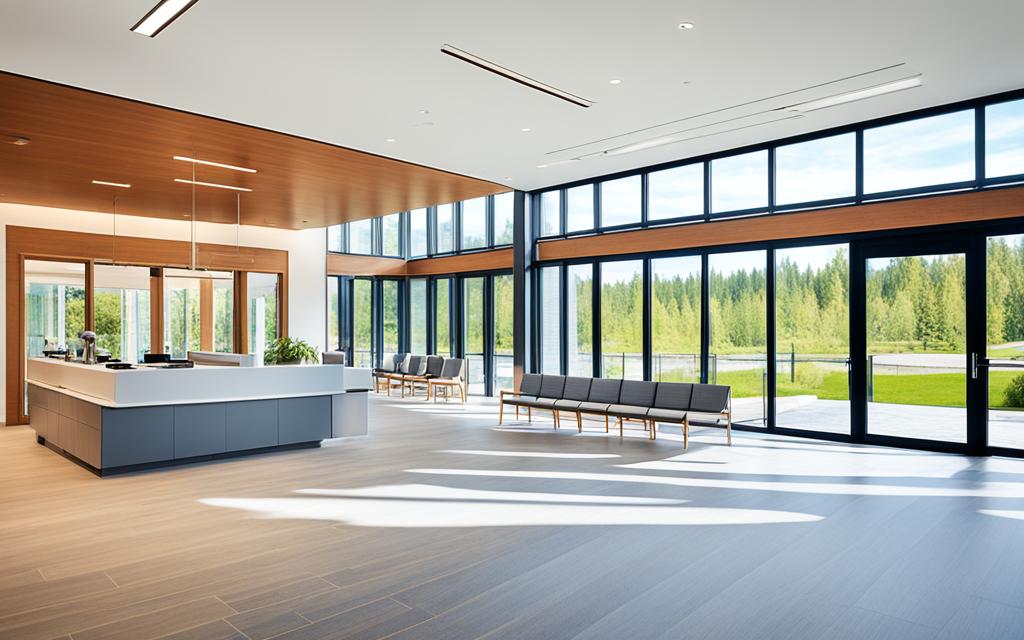Welcome to our series on the healthcare systems of the Nordic Countries! In this article, we will delve into the healthcare systems of Denmark, Finland, Iceland, Norway, and Sweden. These countries are renowned for their efficient and high-quality healthcare systems, providing equal access to all citizens.
From universal healthcare coverage to low out-of-pocket costs, the Nordic Countries healthcare systems offer numerous benefits. They prioritize preventive care and have a strong focus on patient safety. These countries also embrace advanced medical technology, ensuring the provision of high-quality healthcare services.
Equal access to healthcare is a fundamental principle of the Nordic Countries healthcare systems. Regardless of their socioeconomic status, all citizens have access to necessary healthcare services. This commitment to accessibility highlights the egalitarian values that underpin these healthcare systems.
Funding healthcare is a crucial aspect, and the Nordic Countries employ a combination of taxes and social security contributions to finance their healthcare systems. This ensures sustainable and equitable healthcare for all citizens.
If you are considering relocating to the Nordic Countries, understanding the healthcare system is vital. We will provide information on healthcare coverage for expatriates and the process of accessing healthcare as a foreign resident.
The Nordic Countries are also at the forefront of healthcare innovation. From technological advancements to research initiatives, the region continuously strives to improve healthcare services, benefiting both their citizens and the global healthcare community.
In our final section, we will compare the healthcare systems of the Nordic Countries, highlighting their similarities, differences, and the lessons that can be learned from each other. We will also explore the challenges faced by these healthcare systems and the ongoing efforts for improvement.
Join us as we embark on an informative journey through the Nordic Countries healthcare systems. Let’s explore the comprehensive and innovative approaches that make these systems a benchmark in high-quality healthcare.
Benefits of Nordic Countries healthcare systems
The healthcare systems in the Nordic Countries provide a range of benefits to their citizens, ensuring their well-being and overall health. These systems are known for their comprehensive coverage, low out-of-pocket costs, and emphasis on preventive care.
One of the key advantages of Nordic Countries healthcare is the presence of universal healthcare coverage. This means that every resident has access to necessary medical services, regardless of their financial situation or social status. Whether it’s a routine check-up or a complex surgery, individuals can rely on the healthcare system to meet their needs.
Moreover, the low out-of-pocket costs associated with healthcare in the Nordic Countries contribute to the affordability and accessibility of medical services. Citizens benefit from reduced or no costs for doctor visits, hospital stays, and prescribed medications, reducing the financial burden on individuals and families.
Preventive care is another essential aspect of the Nordic Countries healthcare systems. These countries prioritize early detection and disease prevention through regular screenings, vaccinations, and health education programs. By focusing on preventive measures, they aim to reduce the occurrence of chronic illnesses and improve overall population health.
Advantages of Nordic Countries Healthcare Systems:
- Universal healthcare coverage for all residents
- Low out-of-pocket costs, ensuring affordability
- Emphasis on preventive care for better health outcomes
By offering these benefits, the Nordic Countries healthcare systems prioritize the health and well-being of their populations. This results in healthier and more productive societies, demonstrating the effectiveness of their healthcare models.
Quality of Nordic Countries healthcare systems
The Nordic Countries are renowned for their high-quality healthcare systems. These countries, including Denmark, Finland, Iceland, Norway, and Sweden, prioritize patient safety, effective treatment, and advanced medical technology.
One of the key factors contributing to the quality of healthcare in the Nordic Countries is their focus on patient safety. Stringent regulations and guidelines ensure that healthcare facilities maintain high standards of safety and meet stringent quality measures. This emphasis on patient safety helps prevent medical errors and improves overall healthcare outcomes.
The Nordic Countries also invest significantly in the development and adoption of advanced medical technology. From state-of-the-art equipment to cutting-edge surgical techniques, these countries are at the forefront of medical innovation. This technological advancement not only improves the accuracy and effectiveness of medical procedures but also enhances the overall patient experience.
Moreover, the healthcare systems in the Nordic Countries prioritize evidence-based medicine and best practices. Medical professionals undergo rigorous training and adhere to strict guidelines to ensure that patients receive the most effective and appropriate treatments.
In addition to these measures, the Nordic Countries also encourage collaboration and knowledge-sharing among healthcare professionals. This exchange of expertise and best practices further enhances the quality of healthcare services in the region.
Overall, the Nordic Countries healthcare systems have established themselves as leaders in providing high-quality healthcare. Their commitment to patient safety, advanced medical technology, and evidence-based practices ensures that citizens receive the best possible care.
Accessible healthcare in the Nordic Countries
Equal access to healthcare is a fundamental aspect of the Nordic Countries’ healthcare systems. These countries, including Denmark, Finland, Iceland, Norway, and Sweden, have implemented policies and strategies to ensure that all citizens have access to necessary healthcare services, regardless of their socioeconomic status.
One of the key approaches to achieving equal access is the provision of universal healthcare coverage. In the Nordic Countries, healthcare is considered a basic human right, and the government plays a vital role in guaranteeing healthcare services for all residents. This means that individuals do not have to worry about being denied healthcare due to financial constraints or pre-existing conditions.
Additionally, the Nordic Countries place great emphasis on preventive care, aiming to address potential health issues before they become more serious and require more extensive treatment. This proactive approach helps to reduce the burden on healthcare facilities and ensures that individuals receive appropriate care in a timely manner.
Furthermore, the Nordic Countries have implemented strategies to address healthcare disparities that may arise due to geographic location. Remote areas or regions with a lower population density can sometimes face challenges in accessing healthcare services. To tackle this issue, the Nordic Countries have established networks of primary healthcare facilities and clinics in underserved areas, ensuring that individuals living in remote regions can easily access the healthcare they need.
It is important to note that the Nordic Countries healthcare systems prioritize the well-being and health of their citizens above all. This commitment to equal access enables everyone to receive appropriate medical attention, promoting overall population health and well-being.
Next, we will explore the financing of healthcare systems in the Nordic Countries, shedding light on how these countries fund their high-quality healthcare services.
Financing Nordic Countries healthcare systems
Financing healthcare is crucial to maintain and improve the healthcare systems in the Nordic Countries. These countries, including Denmark, Finland, Iceland, Norway, and Sweden, have developed sustainable funding models that ensure equal access to healthcare for all citizens.
In the Nordic Countries, healthcare is primarily financed through a combination of taxes and social security contributions. Taxes play a significant role in funding healthcare, with a portion of the general tax revenue allocated towards healthcare services. This ensures that healthcare is accessible to everyone, regardless of their income or employment status.
In addition to taxes, social security contributions also contribute to healthcare financing in the Nordic Countries. These contributions are usually deducted from individuals’ salaries and are used to fund various social welfare programs, including healthcare. The combination of taxes and social security contributions creates a stable and reliable source of funding for healthcare services.
The Nordic Countries have a long-standing tradition of investing in healthcare, recognizing it as a fundamental human right. The commitment to providing universal healthcare coverage and ensuring equal access has led to well-funded healthcare systems that deliver high-quality care to their populations.
Key Points:
- Healthcare in the Nordic Countries is financed through a combination of taxes and social security contributions.
- Taxes play a significant role in funding healthcare, with a portion of the general tax revenue allocated towards healthcare services.
- Social security contributions, deducted from individuals’ salaries, also contribute to healthcare financing.
- This funding model ensures equal access to healthcare for all citizens in the Nordic Countries.
- The commitment to universal healthcare coverage has resulted in well-funded healthcare systems that prioritize the well-being of their populations.
As we continue our exploration of Nordic Countries healthcare, it is important to understand the funding mechanisms that support these systems. The combination of taxes and social security contributions allows for sustained investment in healthcare, enabling the delivery of high-quality care to all individuals.
Relocating to the Nordic Countries and healthcare
For individuals considering relocating to the Nordic Countries, understanding the healthcare system is crucial. Whether you are moving for work, study, or lifestyle, it is important to have access to quality healthcare services in your new home.
The Nordic Countries, including Denmark, Finland, Iceland, Norway, and Sweden, are renowned for their efficient and high-quality healthcare systems. Expatriates and foreign residents can also benefit from these well-established healthcare systems.
When relocating to the Nordic Countries, it is essential to familiarize yourself with the healthcare coverage available for expatriates. In general, these countries offer comprehensive healthcare coverage for their residents, including foreigners, ensuring that everyone has access to necessary medical services. The specific coverage and eligibility may vary from country to country, but the basic principle of equal access applies.
As a foreign resident, accessing healthcare in the Nordic Countries is a relatively straightforward process. There are various options for finding a healthcare provider, such as public healthcare clinics or private medical practices. Before seeking medical assistance, it is advisable to register with the local healthcare system or obtain private health insurance to ensure you are covered.
It is also important to note that the healthcare systems in the Nordic Countries focus on preventive care, promoting a healthy lifestyle, and regular check-ups. This preventive approach helps maintain the overall wellbeing of individuals and reduces the need for more extensive medical interventions.
Additionally, the Nordic Countries place a strong emphasis on patient privacy and data protection, ensuring that your personal information remains confidential and secure.
Overall, the Nordic Countries offer a high standard of healthcare services, making them attractive destinations for individuals considering relocation. By familiarizing yourself with the healthcare system and understanding your healthcare coverage options, you can ensure a smooth transition and have peace of mind knowing that your health needs will be taken care of in your new home.
Innovations in Nordic Countries healthcare
The Nordic Countries have established themselves as pioneers in healthcare innovations. These nations continually strive to enhance healthcare services through advancements in technology, digital health solutions, and research initiatives. By embracing innovation, the Nordic Countries are able to provide their citizens with cutting-edge healthcare and improve patient outcomes.
One area of innovation in Nordic Countries healthcare is the integration of technology. With the rise of telehealth and remote patient monitoring, individuals can access healthcare services from the comfort of their homes. This not only improves convenience but also increases access to healthcare, especially for those living in remote areas. Technology-enabled solutions, such as wearable devices and mobile apps, empower individuals to take ownership of their well-being by monitoring their health and engaging in preventive care.
Furthermore, the Nordic Countries prioritize the development and implementation of digital health solutions. Electronic health records (EHRs) enable seamless information exchange between healthcare providers, enhancing coordination of care. E-prescriptions reduce medication errors and streamline the prescription process. Digital tools for patient engagement, such as online portals and self-management apps, promote active participation in healthcare decision-making.
Innovation in Research
Research plays a vital role in driving healthcare innovation in the Nordic Countries. Robust research infrastructure and collaborations with academic institutions enable the development of evidence-based practices and breakthrough discoveries. These countries prioritize investment in medical research, fostering a culture of innovation and continuous improvement.
Collaborative research initiatives in the Nordic Countries cover a wide range of topics, including genomics, personalized medicine, and the use of artificial intelligence in healthcare. These endeavors not only contribute to advancements in medical knowledge but also aid in the development of innovative treatment options and diagnostic tools.
The image above highlights the collaboration and innovation that takes place in Nordic Countries healthcare. This rich ecosystem of research and technological advancements drives the delivery of high-quality patient care and positions the Nordic Countries at the forefront of healthcare innovation.
In conclusion, the Nordic Countries continuously push boundaries and embrace innovations in healthcare. Through the integration of technology, digital health solutions, and research initiatives, they enhance access, quality, and patient outcomes. These innovations underscore the commitment of the Nordic Countries to provide their citizens with world-class healthcare services.
Comparing Nordic Countries healthcare systems
When it comes to healthcare, the Nordic Countries are often held up as examples of excellence. Denmark, Finland, Iceland, Norway, and Sweden have all developed robust healthcare systems that prioritize high-quality care, equal access, and preventive measures. While each country has its own unique approach, there are several commonalities that make these systems stand out.
One of the key similarities among the Nordic Countries’ healthcare systems is their commitment to universal healthcare coverage. Regardless of income or social status, every citizen has access to comprehensive healthcare services. This ensures that no one is left behind when it comes to receiving necessary medical care.
However, there are also notable differences between the Nordic Countries’ healthcare systems. For example, Finland has a decentralized healthcare model, where municipalities are responsible for providing healthcare services, while Sweden operates under a more centralized model with county councils in charge. Understanding these variations can help inform discussions on best practices and potential areas for improvement.
Despite their successes, the Nordic Countries’ healthcare systems face challenges as well. Rising healthcare costs, an aging population, and increased demand for specialized care are just a few of the issues that these countries are grappling with. Nevertheless, they continue to invest in research, technology, and innovation to ensure the sustainability and continuous improvement of their healthcare systems.













